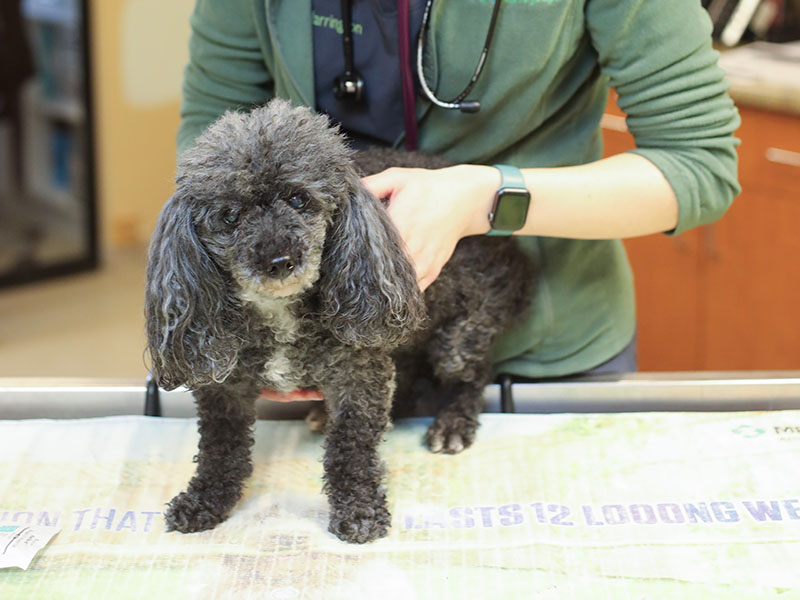Pet Pain Management in Virginia Beach, VA
No pet should have to live with pain. Whether it’s post-surgical recovery, arthritis, or chronic illness, we tailor pain management plans to help your pet feel better, faster.

Pain-Free Living for Your Beloved Companions
At Pet Care Veterinary Hospital, we understand that our pets can experience pain much like we do, whether it’s from injury, surgery, or chronic conditions. That’s why our dedicated team is committed to providing compassionate and effective veterinary pain relief in Virginia Beach, tailored to the unique needs of your pets.
Pain Management
Pets can show pain in different ways. Common myths can encourage pet owners to dismiss concerns about pain if their pet is walking or eating. In reality, there are other signs besides eating habits and mobility that can indicate pain. Discomfort can also easily be mistaken for normal aging. Our veterinarians have the experience and expertise to evaluate and score a pet’s pain. This is particularly important for pets with pain signals that are more difficult to recognize, like birds, reptiles, and other exotics.
We specialize in chronic pain care for dogs and cats in Virginia Beach, helping your pet live more comfortably and actively.
There are some signs pet owners can watch for if they think their pets might be in pain. If a pet is experiencing some of these symptoms, it’s important to consult a veterinarian for a pain evaluation.
Signs of Pain
Changes in Behavior
- Aggression or Irritability: Pain can make pets more sensitive, leading to increased aggression or irritability.
- Withdrawal: Some pets may become more reserved and avoid interaction with people or other animals.
Altered Eating Habits
- Decreased Appetite: Pain can affect a pet’s interest in food, which leads to a reduced appetite.
- Difficulty Chewing: Oral pain may result in changes in chewing behavior or reluctance to eat.
Mobility Issues
- Limping or Favoring a Limb: Pain in joints or limbs can cause limping or reluctance to put weight on a specific leg.
- Stiffness: Arthritis or other painful conditions may result in stiffness or difficulty moving.
Changes in Vocalization
- Increased Whining or Whimpering: Pain may lead to vocalization changes, such as whining, whimpering, or meowing.
- Unusual Vocalization during Touch: Pets may react vocally when a painful area is touched.
Grooming Changes
- Decreased Grooming: Pets may groom less if in pain, resulting in an unkempt appearance.
- Excessive Grooming: Conversely, some pets may excessively groom or chew at a painful area.
Posture Changes
- Hunched Back: Pets experiencing abdominal pain may adopt a hunched posture.
- Guarding or Protecting an Area: Painful areas may be guarded or protected from touch.
Sleep Disturbances
- Restlessness: Pets in pain may have difficulty finding a comfortable position, leading to restlessness.
- Excessive Sleeping: Conversely, some pets may sleep more to cope with discomfort.
Facial Expressions
- Dilated Pupils: Cats, in particular, may exhibit dilated pupils when in pain.
- Tense Facial Muscles: Tension or tightness in facial muscles can indicate discomfort.
It’s essential to note that some pets may mask signs of pain, which can make early detection challenging. Regular veterinary check-ups are crucial for identifying and addressing pain issues promptly. If you notice any unusual behavior or suspect your pet is in pain, consult with your veterinarian for a thorough evaluation and appropriate care.
Our Pain Management Services
Individualized Treatment Plans
Our experienced veterinarians craft personalized pain management plans, considering the specific needs and health conditions of each pet.
Alternative Therapies
In addition to traditional methods, we offer alternative therapies such as CBD, Adequan supplements, and laser therapy for pets in Virginia Beach, to provide holistic pain relief options for your pets.
Physical Rehabilitation
Our comprehensive approach includes physical therapy and rehabilitation exercises to enhance mobility, reduce stiffness, and improve overall quality of life.
Pharmacological Therapies
We utilize the latest advancements in veterinary medicine to offer a range of safe and effective pain relief medications, ensuring optimal comfort for your pets. These include medications like Librela and Solensia, which offer a lot of relief for osteoarthritis patients and are key to effective arthritis treatment for pets in Virginia Beach.
At Pet Care Veterinary Hospital, we believe in addressing pain from all angles, combining medical treatments with compassionate care to ensure your pets experience comprehensive relief. Our team monitors your pet’s progress closely, making necessary adjustments to their pain management plan to guarantee the most effective and comfortable outcome.
By managing pain effectively, we contribute to your pet’s overall well-being, promoting a happier and healthier life. Contact us today to discuss how our pain management services, including expert arthritis and chronic pain care, can make a difference in your pet’s life.
